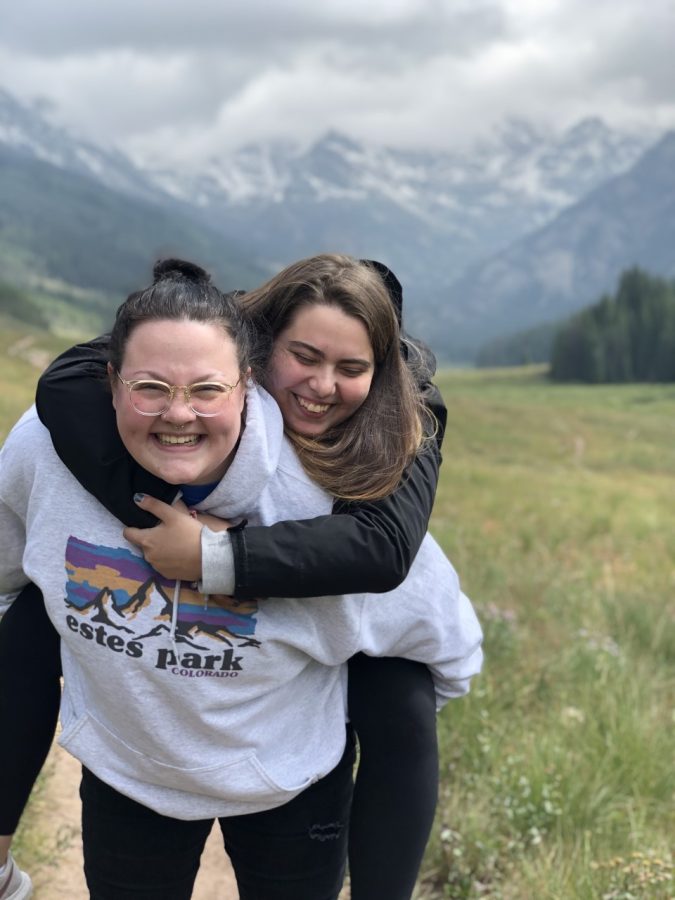What Valentine’s Day means to the LGBTQ+ community
UW-W student Andi Britton gives her romantic partner, Mackenzie O’Connor, a piggy-back ride during a hike.
February 13, 2022
Hearts are filling the air for Valentine’s Day 2022. The holiday has evolved to one celebrating the romantic partnerships in people’s lives. It’s hard to miss advertisements for meals, jewelry, and other gifts to get for that special person in your life. Yet, there seems to be one common thread tying the couples in these adds together: Most are all in heterosexual relationships.
With several organizations and resources for LGBTQ+ students at the University of Wisconsin-Whitewater campus and in the Whitewater community, it is apparent that there is a large population of LQBTQ+ members in our community. Despite this fact, some members of the community still feel excluded from this day of love more than others.
“Valentine’s Day almost doesn’t feel like it’s for us because that’s not what society portrays as normal,” says Mackenzie O’Connor while speaking about her romantic partner, senior women’s and gender studies major Andi Britton.
“Sometimes, I talk to my dad – who is a cisgender, white male – about my fears holding my partner’s hand in public since we are both female-presenting. We get looks. People don’t agree with the way we love and the way we choose to show our love,” says O’Connor. “My dad will just say to not let it get to me, but there is sometimes a safety issue with showing affection in public.”
This fear is rational. According to the 2019 FBI hate crimes statistics, sexual orientation and gender identity are still ranked as the third and fourth most common reasons why people experience violence. Most of these crimes target people who are gay, 61.8 percent, lesbian, 10 percent, and a mixed group of people who are transgender and bisexual, 25 percent. Even past the safety concerns, students who are part of the LGBTQ+ community also face non-violent backlash.
Junior business major Ethan Wyland spoke of a time when his ex-boyfriend and himself weren’t treated the same as other couples.
“The restaurant we went to had free dessert for couples who came in on Valentine’s Day. When we were trying to get our dessert at the end of our meal, we were denied. The waiter told us that two men can’t be in a relationship.”
Because of this, many people in queer relationships feel as though they have to prove the validity of their partnerships.
“For queer couples, there seems to almost be a second pressure to show off what you did for Valentine’s Day. You have to prove yourself in a sense. But I also have the urge to not celebrate it at all, to just have it be a regular day,” says O’Connor.
It can be easy to get caught in the tidal wave of pressure to make grand gestures on this holiday.
“Take Valentine’s Day to be kind to everyone around you,” advises senior social work major Miles Duckert. “Love can be platonic. Be kind to your friends; and support the queer people in your life if they’re feeling vulnerable.”
Planned Parenthood has a page dedicated to the education of people inside and outside the community. There, resources can be found such as the Trevor Project, a non-profit organization dedicated to suicide prevention of members of the LGBTQ+ community.
Altogether, it seems the best way to support queer couples is through respect. Britton says it’s important to treat all romantic partners with the same regard.
“Love is still love, period. Just because it is Valentine’s Day doesn’t mean love can’t be for everyone,” said Britton. “I want to be looked at the same way as your stereotypical, straight couple.”
For more information on the UW-W LQBTQ+ club click the link HERE
For FBI hate crime statistics click the link HERE
For more information on the LGBTQ+ community click the link HERE
For more information on the Trevor Project click the link HERE













